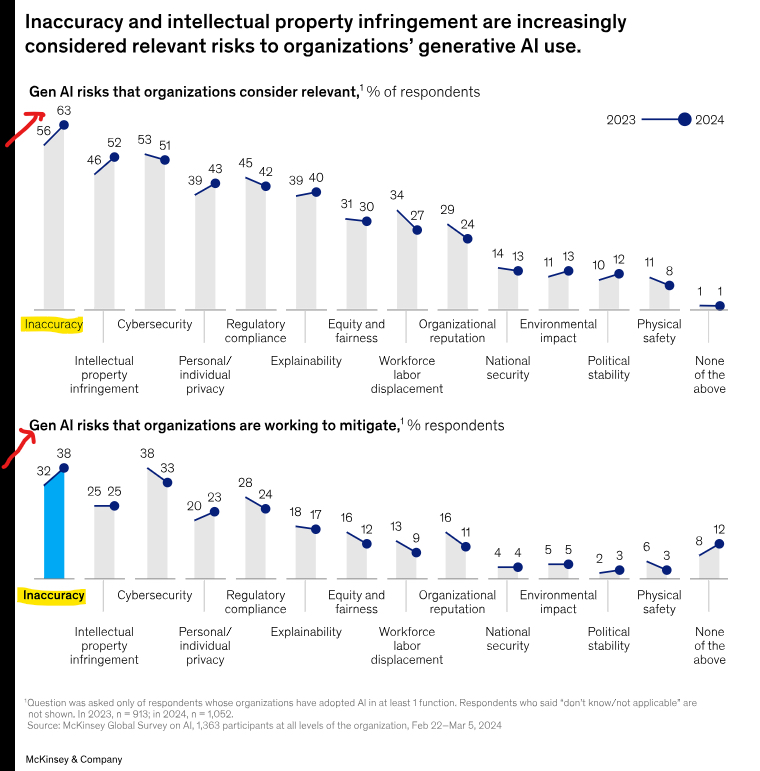
Apple Took the Stage for WWDC (We Will Distribute ChatGPT)
A slew of new releases has changed technology’s future
June 16, 2024
Hello, happy Sunday, and welcome to Context Window.
Big changes often start with small tweaks. Over the past eight months, we’ve gradually made some changes to the Sunday Digest, adding new sections: a tightly edited curation of links and insights, an illuminating chart, feedback from our readers, a vision of a future application of technology, and, today, a recommendation from the week’s guest writer. Today we’re also giving it a new name, Context Window, to reflect our belief that AI is the most important technology of the last decade.
Our goal at Every is to tell you what happens next—to help you understand what’s happening in technology and why it matters—with a sprinkle of inspiration. Each Sunday, whether you're reflecting on the week that was or preparing for the one to come, we hope to leave you informed, entertained, and enlightened. As always, let us know what you think in the comments.—Kate Lee
Was this newsletter forwarded to you? Sign up to get it in your inbox.
Knowledge base
“Apple's AI Evolution: Built-in AI, Supercharged Siri, and Ecosystem Lock-in" by Evan Armstrong/Napkin Math: Apple's latest announcements at WWDC demonstrate how the tech giant is baking AI into every aspect of its ecosystem. Read this to understand how Apple is positioning itself to maintain its dominance in the age of AI.
🔏 “Apple Embraces the Enemy” by Dan Shipper/Chain of Thought: In an important turn of events, Apple has integrated OpenAI's ChatGPT directly into iOS. Read this to understand the implications of this unlikely alliance and what it means for the future of AI.
"How AI Image Models Work" by Nir Zicherman: Imagine asking children to uncover a story plot from a sentence full of typos. That's essentially what AI models do with images, but using visual noise instead of words. Read this if you want to understand the fundamentals of how tools like DALL-E work without any technical jargon.
🎧 “What Do LLMs Tell Us About the Nature of Language—And Ourselves?” by Dan Shipper/AI&I: New York Times best-selling novelist Robin Sloan tried to write his latest book with AI. It didn't work, but the attempt uncovered deep insights about what language models reveal about the very nature of language, stories, and the self. Listen to or watch this if you want to ponder the ineffable mysteries at the intersection of AI and the human experience. 🔏 Paid subscribers have access to the episode transcript.
"The AGI-in-2027 Thesis" by Evan Armstrong/Napkin Math: In this piece, Evan digs into the assumptions behind the argument that we’ll reach superintelligence by 2027 and finds that, while the future of AI is undoubtedly exciting, we need to be cautious about overhyping its potential. Read this if you want a clear-eyed look at the state of AI research and what it means for the future of work.
🔏 "Inside the Pod: From Idea to Startup in Minutes With AI" by Rhea Purohit/AI & I: What if you could go from startup idea to pitch deck, website, and customer interviews in minutes? That's what Nicholas Thorne is building with Audos, an AI-powered chatbot that helps founders launch businesses at lightning speed. Listen to or watch the latest episode of AI & I to learn exactly how.
Sentiment analysis
Gareth Edwards’s story about Don Estridge (also available as an audio essay), who spearheaded the IBM PC, garnered some additional details about the company’s PC launches:
“The entire PC organization had about 100 people when I started working with them. Two years later, there were 10,000 folks in the IBM PC group.”—A then-outside advisor to the IBM PC Strategic Planning Group
“Some may be interested to note that the PC AT shipped with a 286 [processor] in 1984. The PS/2, launching with a 286 six months after the Compaq Deskpro, must have caused quite a lot of stunned silence, especially to anyone familiar with the advantages of the 386’s memory addressing (and the flaws in the 286’s in relation to programmability).”—A reader
Want to chat? DM Dan or Evan on X.
Fine tuning
What AI winter? OpenAI’s revenue continues to rip, hitting an annualized run rate of $3.4 billion, up from about $1 billion in the summer of 2023. As a seasoned pro, trust me on this take: Adding $2 billion in revenue in a year is considered very good.
Retail investors are played for fools. As we’ve been talking about for the last couple of weeks, GameStop has rallied with the return of its most prominent meme-stock demigod, Roaring Kitty. The company’s management successfully took advantage of the idiots—sorry, Reddit users—who fueled the stock prices growth by selling about $2.14 billion of stock. The house always wins (buy index funds, you dummies).
The complicated man in the arena. Elon Musk had a strange week, even by his standards: He was given a $46 billion pay package by Tesla shareholders (great!) and had horny texts he’d sent to employees at his companies published in the Wall Street Journal (oof!). This is worth noting simply because there has probably never been one person in charge of more powerful technologies than Musk (X.AI, spaceflight, electric vehicles, X, etc). I can’t help but wish that he had a somewhat stable personal life so he could be a moral paragon on top of being a technological giant.
Startups, startups that need startups, are the luckiest startups. Two M&A transactions in which private companies bought other private companies caught my eye. French video game developer Voodoo purchased social network BeReal for €500 million. My column has argued previously that in this AI world, distribution is king (especially for content companies like video games). On the B2B side, investment research platform Tegus was purchased by investment research platform Alphasense for $930 million. Tegus was valued at $3 billion in November of 2021. LLMs are at their most beneficial with large amounts of data, so it makes sense for the companies to pool resources so they can focus on benefiting from the AI wave.
A €0 to €6 billion valuation in 12 months. Mistral raised €600 million, with €468 million in equity and €132 million in debt, at a €5.8B valuation. This is one of the fastest valuation increases I’ve seen in the first year of a startup. I have no clue if this company will work, but I like seeing competition with OpenAI’s hegemony.—Evan Armstrong
Data mining
Survey says: Stop making things up. McKinsey’s recent survey on the “state of AI” shows that model inaccuracy is both the number-one risk and the number-one area of mitigation for enterprises working with AI:
Source: McKinsey.
The share of respondents who identified AI inaccuracy as a “relevant” risk jumped from 56 percent to 63 percent. While LLMs may seem human—based on human-like responses to prompts—it’s becoming clearer to people that they are not. LLMs are statistical inference machines trained to generate the most likely sequence of results, and “the most likely sequence” is a very different sort of ground truth than what we generally regard as knowledge or understanding. LLMs are, in that sense, always guessing, albeit with a proficiency and breadth that machines have never had before. It is incredibly powerful technology, and better business results will follow as people recalibrate their expectations for what LLMs can (and are) actually doing. It’s just less like human intelligence than the hype machine wants you to believe.—Moses Sternstein
Keyword extraction
We asked founder and entrepreneur Nir Zicherman, who wrote our story about how AI image models work, to share one good listen:
🎧 “The Complete History & Strategy of Microsoft”/Acquired: “The discussion of the deal Microsoft did with IBM in the early days is fascinating. They say it's arguably the most important business deal of all time—not just in tech, but in business generally. Everyone should listen to that section to gain insight into how much that one agreement changed the course of the entire world.”
Alignment
Wisdom wanted. The most important subject I'm trying to wrap my head around isn't AI. It's philosophy. Technology is advancing like a rollercoaster without brakes, and, as passengers, we're either going to experience existential whiplash or have our minds blown by the philosophical implications of it all—or both. In his book Thus Spoke Zarathustra, Friedrich Nietzsche introduces the concept of the Übermensch, or the superman, a vision of what humanity could become. What I find most compelling about the Übermensch is its fundamental optimism. Nietzsche sees the chaos and unpredictability of his world not as a threat, but as an opportunity. It's a fantastic framework through which we can view AI—as a catalyst for our own growth and potential instead of as a looming existential risk. While people grapple with the implications of AI in the coming years, I expect that many will turn to philosophy for guidance and perspective. Thus Spoke Zarathustra might be the best place to start that journey.—Ashwin Sharma
Hallucination
What if ChatGPT was a standalone desk device?
Source: X/Lucas Crespo.That’s all for this week! Be sure to follow Every on X at @every and on LinkedIn.
Find Out What
Comes Next in Tech.
Start your free trial.
New ideas to help you build the future—in your inbox, every day. Trusted by over 75,000 readers.
SubscribeAlready have an account? Sign in
What's included?
-
Unlimited access to our daily essays by Dan Shipper, Evan Armstrong, and a roster of the best tech writers on the internet
-
Full access to an archive of hundreds of in-depth articles
-
-
Priority access and subscriber-only discounts to courses, events, and more
-
Ad-free experience
-
Access to our Discord community





Comments
Don't have an account? Sign up!